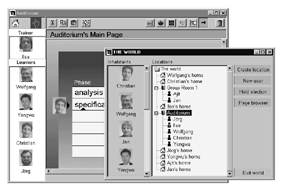Cooperative Learning Environments - Effective Support for Distributed Teams
by Martin Wessner and Jörg M. Haake
A newly established interdisciplinary work group at GMD's Integrated Publication and Information Systems Institute in Darmstadt, Germany, investigates support for cooperative learning in small distributed teams. The current prototype of the Cooperative Learning project (CLear) provides a virtual learning world with rooms for individual learning and working, special cooperative rooms for group work and for presentations. First encouraging evaluation results from a course at Darmstadt University of Technology demonstrate potential benefits of the virtual learning world and suggest possible extensions for the future.
In today's dynamic business world, lifelong learning is a vital precondition of success. Often, the necessary knowledge to fulfill job requirements is not available from books, but is created in organizations and companies during the progress of the work. As a general goal, a method is required to utilize this distributed knowledge, storing, retrieving, presenting and using it on the job.
A special challenge is the exploitation of the potential of cooperation in producing, comprehending and handling this information. The CLear project deals with the development of cooperative learning environments that aim at supporting such learning processes by providing a seamless transition between work and learning. Our focus is on adult learners who want to gain knowledge and build skills in a task-oriented manner and in small groups.
In the CLear project, we take different learning dimensions into consideration:
- synchronous and asynchronous learning
- distributed and co-located learning
- individual and group learning.
With the proper assistance from the cooperative learning system, all phases of individual and cooperative learning can be supported. To reach this goal, we take a learner-centred, interdisciplinary approach: in CLear there is strong cooperation between psychologists, instructional designers, educational and computer scientists. Based on a model of cooperative learning and a hypermedia data model we identify learning scenarios and analyse them with respect to possible assistance by a cooperative learning environment.
We use the metaphor of virtual rooms containing learners, trainers/tutors and learning material in the form of hypermedia documents. Within these rooms, the cooperative learning environ-ment offers functionalities which support individual and group learning. This infrastructure enables the cooperative acquisition of knowledge and skills largely independent of time and space.
The actual prototype is developed with the COAST framework which allows quick development of cooperative applications. It supports asynchronous learning (individual exercises and self-study), synchronous interactive presentation (briefings, demonstrations and presentations), and synchronous cooperative learning (group work, discussion).

Figure: A screenshot showing the virtual learning world and the auditorium.
To integrate and support these phases, CLear provides virtual rooms for individual learning and working and special group work rooms and lecture halls. Learners are connected to each other and the teacher by audio/video and data networks. They can create and edit documents individually or cooperatively in their virtual individual rooms, in group rooms or in public places, ie an auditorium. For example, they can jointly manipulate, annotate and link hypermedia objects such as texts, graphics or scribbles.
We are currently working on the smooth integration of audio/video communication into the CLear environment. By refining the user and group model we intend to achieve simple handling of access rights. Through creating awareness of rooms and situations we want to improve storage and retrieval of knowledge.
More information can be found at: http://www.darmstadt.gmd.de/concert
Please contact:
Martin Wessner - GMD
Tel: +49 6151 869 954
E-mail: martin.wessner@gmd.de
Jörg M. Haake - GMD
Tel: +49 6151 869 918
E-mail: joerg.haake@gmd.de
